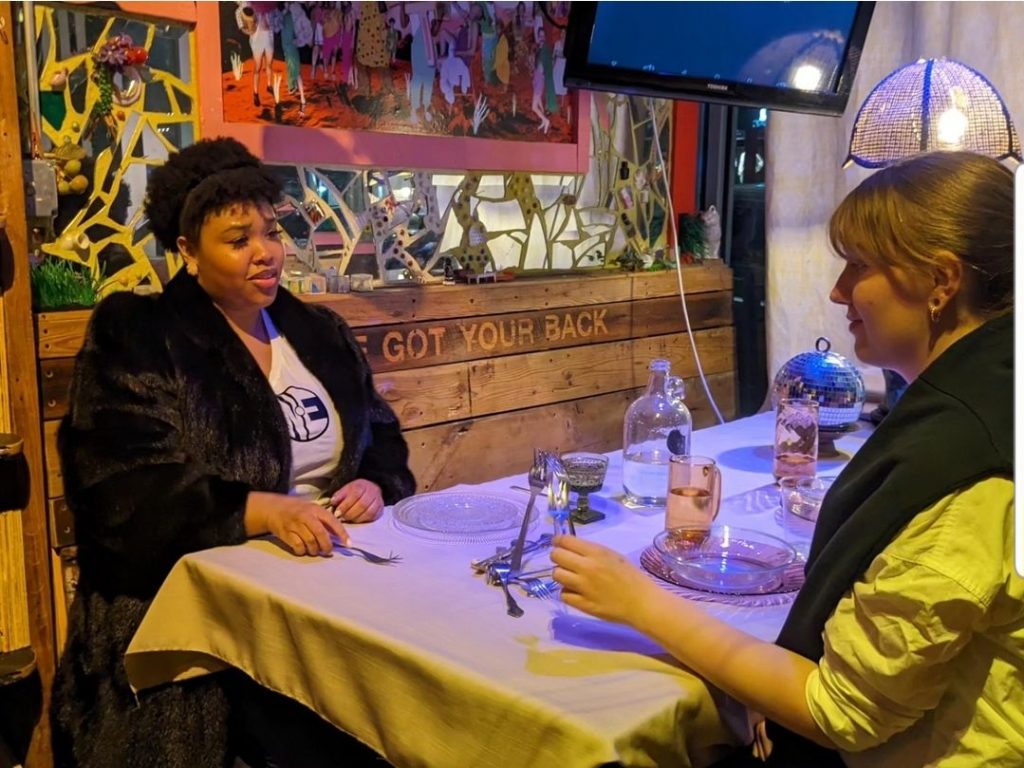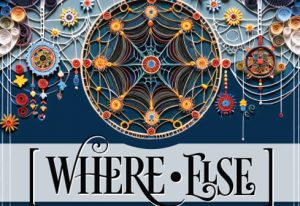
Assistant Professor of Theatre Robi Arce-Martínez poses a question, “Where else but at UNCG’s School of Theatre?”
He’s talking about a new theatre work called [where-else] which opens April 5th at Elsewhere, an artist residency and museum in downtown Greensboro. Arce-Martínez and 19 students from all majors across the school developed the piece together.
“The project is very much based in storytelling, and it serves as a forum for students to engage in collaboration and collective creation, while at the same time, sharing lived experiences and differences to find common ground, to then develop new material which is also influenced by the space.”
The space is Elsewhere Museum. And while it has the word “museum” in its name, Elsewhere is probably nothing like what you might imagine a museum to be. For fifty-eight years, the three-story building on Elm Street was owned by long-time resident Sylvia Gray and housed a store that sold furniture, fabric, military surplus, and secondhand goods. When she died, her grandson George Scheer inherited the building.
“George and two friends from Michigan declared nothing for sale and named the space as we know it today, Elsewhere. He decided that this was going to be a place where artists come from anywhere in the nation or even abroad, and work with the objects that are already in there to create installations or artistic residencies,” explains Arce-Martínez. “The rule of Elsewhere is that everything created in the space needs to happen with the objects that are already in there. So, the rule is that nothing comes in, nothing goes out. There is this eternal cycle of destruction and creation that I think is beautiful and energizing.”
Arce-Martínez has served on the board of Elsewhere since he arrived in Greensboro in 2021. He proposed it as a space to School Director Natalie Sowell because the school was looking for new opportunities for students while Taylor Theatre was closed for renovations, and because they wanted to add a community-based theatre project to the season.
“When you come to the show, you’ll see that elsewhere has a lot going on,” he laughs adding, “It will be immersive and you will not be sitting and watching a show, rather it’s more of an engagement. The audience will move through the space, too, and because the spirit of this work is collaboration, we’re making space for the audience to be a part of it. Yes, it’s scripted, but there is some looseness to it because we want to allow room for discovery and understanding that the work never ends.”
The work began with improvisation.
“This is very much a process-driven show. Rather than starting out with a storyline or plot to work around, we started by brainstorming topics. Some themes began to emerge. Things like fear about the future, self-image, social media, politics, individualism versus community art, women’s treatment of each other, and workers’ rights.”
After gathering themes, students created a series of questions that they took to their own communities to interview someone they looked up to—a family member or mentor. They came back to the rehearsal space and shared what they’d learned. Based on their findings the students began to workshop the ideas and develop material.
“It’s in the same spirit of Elsewhere, that of creation, destruction, and recreation. You create, create, create, gather, gather, gather, then at the end you go back and decide what it is you want to put forward. We had to find a common anchor that would be the umbrella for all of the stories, and we arrived at the topic of collective liberation, which states that none of us are free until all of us are free.”
Arce-Martínez is the show’s director, but he says he’s more of a facilitator. The students auditioned to be a part of [where-else], and casting was purposefully based on a desire to include students from all tracks—the BA in Drama, the BFA in Acting, the BFA in Technical Production and Design, and the BA in Theatre Education.
“There can be a separation between students in various areas of the program. My goal was to make a space for them to work together and have broader conversation, while giving each of them agency and leadership.”
The project is also showing students that their lives as artists will not just be about finding work but making the work for themselves.
“It‘s been very beautiful and refreshing to hear them talk about an experience that has been new for them in terms of how to approach the work, but also how to work with each other and have the agency of creating things on their own versus waiting for me to tell them what to do. It’s also about being interdisciplinary. That’s something I noticed when I came into academia and began working with students. There tends to be a disconnection between theater students and art. Sometimes they don’t recognize that what they do is an art form and that there needs to be a conversation with art. I’ve been trying to implement that conversation in my curriculum, because at the end of the day you are reaching out to people’s lives, and you should be asking how do you want them to feel? This is part of my own practice—raising questions instead of bringing statements. Inspire the audience to leave this place thinking about what they just saw.
Because if you do that, then you’re planting a seed, and eventually it will continue to evolve somewhere else.”

[where-else]
Elsewhere Musem
606 S. Elm Street, Greensboro, NC
April 5, 6, & 13 @ 7:00 pm
April 7 & 14 @ 2:00 pm
Rating: PG -13
This production contains adult content and language including descriptions of domestic abuse, exploitation, depression, and graphic sexual acts. The audience will be moving throughout the Elsewhere Museum during the production including up and down a steep flight of stairs. The audience will encounter loud sounds and intense visual experiences.
Approximate run time: one hour
Special Thanks:
Robi wants to give a huge and special shoutout to the Elsewhere museum and Kerri Mubaarak (Executive Director) for opening the space to UNCG’ School of Theatre and for continuously dreaming of new, creative and solidary futures with our community.
Story by Terri W Relos
Photo credit: Josh Ritter